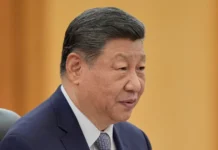The Trump administration has instructed U.S. embassies to classify other nations’ diversity, equity, and inclusion (DEI) policies, abortion subsidies, and the facilitation of mass migration as infringements on human rights. This directive marks a significant shift in American foreign policy, expanding the administration’s domestic cultural battles to the global stage.
The new rules, issued to diplomats compiling the annual Country Reports on Human Rights Practices, redefine long-standing human rights principles. According to internal guidance, U.S. missions must now report on countries that enforce “racially discriminatory employment practices” under the banner of DEI, provide subsidies for abortion, or enable “mass or illegal migration.”
A senior State Department official, speaking anonymously, defended the change, stating the rules are “a tool to change the behaviour of governments” and are grounded in the belief that rights are “given to us by God, our creator, not by governments.”
The guidance also identifies specific practices as violations, including:
- Providing gender-transition surgeries for minors, described as “chemical or surgical mutilation.”
- Enforcing laws against online hate speech, characterized as “arrests or official investigations or warnings for speech.”
- Facilitating mass migration across a country’s territory.
State Department Deputy Spokesperson Tommy Pigott stated the instructions aim to stop “new destructive ideologies [that] have given safe harbour to human rights violations.” He emphasized the administration would not let violations like “the mutilation of children, laws that infringe on free speech, and racially discriminatory employment practices… go unchecked.”
Critics have condemned the move as a politicization of America’s human rights diplomacy. Uzra Zeya, a former senior State Department official now with Human Rights First, accused the administration of “weaponising international human rights for domestic partisan ends.”
“Attempting to label DEI as a human rights violation sets a new low,” Zeya said, adding that the policy conveys “jaw-dropping” animosity towards LGBTQI+ people and excludes the rights of women, religious minorities, and non-believers.
This new framework follows the administration’s August human rights report, which was notably scaled back from previous years. That report reduced criticism of allies, escalated disapproval of adversaries, and eliminated entire sections on issues like government corruption and LGBTQ+ persecution, signaling a strategic departure from the report’s historically bipartisan scope.
By James Kisoo



















